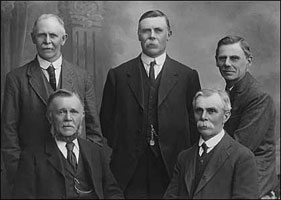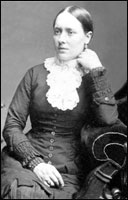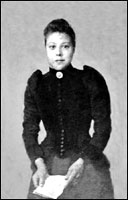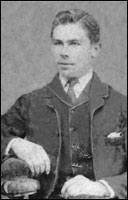|
|
The Swannell Family
|
|
Castlethorpe Census 1871
|
||||||||||
|
Page
|
No. of schedule
|
Forename | Surname |
Relation to head of family
|
Condition |
Age Male
|
Age Female
|
Occupation
|
Where Born
|
County |
|
|
||||||||||
|
5
|
23
|
Job | SWANNELL | head | married | 40 | Railway labourer | Hanslope | BKM | |
|
5
|
|
Elizabeth | SWANNELL | wife | married | 43 | Castlethorpe | BKM | ||
|
5
|
|
Catherine | SWANNELL | daughter | unmarried | 19 | Charwoman | Castlethorpe | BKM | |
|
5
|
|
Joseph T. | SWANNELL | son | unmarried | 17 | Ag. labourer | Hanslope | BKM | |
|
5
|
|
Henry | SWANNELL | son | unmarried | 13 | Ag. labourer | Castlethorpe | BKM | |
|
5
|
|
William | SWANNELL | son | unmarried | 11 | Ag. labourer | Castlethorpe | BKM | |
|
5
|
|
John | SWANNELL | son | unmarried | 8 | Scholar | Castlethorpe | BKM | |
|
5
|
|
Job | SWANNELL | son | unmarried | 5 | Scholar | Castlethorpe | BKM | |
|
5
|
|
Elizabeth H. | SWANNELL | daughter | unmarried | 2 | Castlethorpe | BKM | ||
|
|
||||||||||
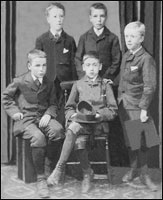 |
|
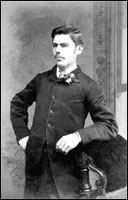 |
|||
|
Northampton Mercury 05 December 1807
Freehold House and Premises, Castle-Thorpe, Bucks near Stony-Stratford. To be SOLD AUCTION, By JOHN DAY, In one Lot, on Thursday the 10th Day of December instant, at Four o'Clock in the Afternoon, the Sign of the Kings-Arms, in Thorpe aforesaid, A Neat DWELLING-HOUSE, with a Yard, and a Well of excellent Water, Stable, Barn, Butcher's Shop, Fasting - Houses, and other Conveniences, in complete Repair, late in the Occupation of Mr. John Swannell, Butcher, deceased. There are several Fixtures on the Premises which may be taken by the Purchaser at a Valuations. Immediate Possession may be had. For View of the same, and further Particulars, apply to Mr. Swannell, Maltster, in Thrope; or the Auctioneer, in Stony-Stratford. Northampton Mercury 16 August 1879
HANSLOPE. Mr, Joseph Arch addressed an enthusiastic and crowded meeting of the N.A.L.U., at the Swan Inn Assembly Room, on the 7th instant. Mr. Joseph Swannel, of Castlethorpe, who presided, dwelt at considerable length on the farmers and their men, believed the Union deserved the support of all the labourers. He strongly advocated the cause of the labourers, and said that before long he sincerely hoped that the county franchise would soon be in their hands. Mr. W. Hayward, secretary of the Northampton and Bucks district, said that the N.A.L.U. was gradually growing in strength, and gave instances where the income had been nearly doubled certain districts during the past few months. He moved, "That this meeting feels highly gratified at the renewed prosperity of the Labourers' Union, several parts of the country. And, being deeply convinced that the Union is as necessary now as ever was, if not more so, and earnestly recommends every labourer join the movement, and stick to it." Mr. John Page, treasurer of the Hanslope Branch, said that gave him great pleasure to second the resolution. The Chairman then called upon Mr. Arch to address the meeting. Mr. Arch, who was received with loud cheers, said : I think it is nearly two years since I addressed a' large audience in this room. At that time I advocated the principles of the National Union, I trust, to the best of my ability. I have seen no reason whatever to change my views that point, nor have I discovered as yet any better method of my fellow-labourers advancing in the social scale than uniting together. I don't know hardly whether I shall make what may be termed practical speech to-night, or an historical one. Perhaps, I should be taking the wisest course if I give you a little bit of the history of this movement. I need not tell you that commenced in 1572, and that that time the labourers of England were receiving very low wages indeed. I will tell you how much the labourers' wages advanced in 40 years, that is, according to your own Government Blue Books on agricultural statistics. Forty years it took the labourers of England to gain a general advance of 3s. a-week. Now, this Union had not been started four years before the labourers as a rule, gained as much as that. (Hear, hear.) Now, it took 40 years without an organization, to raise our wages, and the wages of our fathers, and we, by an organisation, could raise our wages the same amount in four years, I say is not this organisation worthy of every man's support! (Hear, hear.) But, course, we never expect to do all things right for everybody. When my fellow-labourers first made an appeal to me to come forward and speak on their behalf I was not so ignorant but to know that I was likely to make mistakes, I was not so blind but that I knew that I would enrage the farmers of this country. I was prepared, as far as my humble judgment would let me, and to the best of my ability, not to injure the farmer, but to benefit my fellow labourers. It may be that the right man did not take this question hand. Perhaps if some rich nobleman had taken up this question he might have made it a greater success (No, no!) But all I had to bring before the British public was thirty years' experience of married life as an agricultural labourer, whose wife had borne him eight children, and had to suffer the pinchings of want, the hardships hard toil, with but very little to satisfy nature, and with a rough old smockfrock. And these were all the recommendations I had to appeal to the common sense of the public. Well, that was not much, you will say. I have read the starting and success of several movements in this country during my little experience. I can remember the great Corn-law agitation— though I was but a boy—but I never can remember, nor have read of an organisation which struck this country with so much surprise, which inflamed in the minds of so many thousands of England's farm labourers the desire to rise as did this movement when first started. It went far beyond my most sanguine expectations. You scarcely found a paper in the kingdom, after this movement had been in existence not more than a month, but what was noticing the agricultural labourers' rising. Well, there must be something higher and nobler than Joseph Arch's smockfrock ; there must be something more of supernatural power than what was coiled up in his small brain. It was this fact—the labourers were gone down in the social scale to that extent of poverty that, if you will allow me to use the metaphor, like a drowning man, they the first straw that they thought would help them up the social ladder. At that time hundreds of labourers rushed into this Union. I could only have wished they had stayed through with it till to-day. (Hear, hear.) Now, just quietly passing along, I might tell you at the outset that, before we had started our Union a month, we had in the neighbourhood of my own home 250 men sent adrift. We had no means to support them, but when the British public were appealed to, when our liberal and generous-hearted trades unionists knew, what did they do? They rushed to our assistance, and, while we began that first battle with no ammunition in the magazine, after seven weeks' hard fighting, I may tell you that not a single man went back until had gained his rights, and, after seven weeks' hard fighting, we finished the campaign with £800 our funds. (Cheers.) Now what was the idea that struck the officers of the movement at that time? They said, " There are other counties where the labourers are as badly paid, and as badly treated as have been Warwickshire; the principles of the Union are floating the air, and men are drinking them in almost every county ; it very possible that the men in these counties will have to fight a similar battle to the one we have had to fight." It was proposed, seconded, and carried, that any working man in any part of the kingdom, who felt disposed to unite with us, if they were called upon to fight a battle, that that £800 should be used, as well as the contributions of our newly formed Union—should be used to the last penny, to fight the rights of the working-man in any other part of the kingdom. (Cheers.) Will anyone tell me that that was a low, mean, selfish object? We can stand as leaders of this national organisation upon firm and honourable vantage ground. I won't go through the various details of 1873, but let us come to 1874. The Union began to spread through number villages the county of Bucks. went into Norfolk and Suffolk, and somewhere about thirty counties of England became, as our opponents say, tainted with the spirit Unionism. Well, in 1874, the farmers in the eastern counties, as you all well remember, said, “This Union is growing into a giant of strength these men will soon be too much for us. We must use every means within our reach—yes, sir, either fair or foul—to crush this organisation." Great land proprietors backed the farmers in their efforts to crush them. If they had crushed the men of the eastern counties, they would have crushed the men of Buckinghamshire and Warwickshire, and we knew it. We struck a blow for freedom, and we meant to have it, cost what it might. Some 4,000 men one time were thrown out of employment; and what had our Union then got to fight that tremendous battle with? £3,000, looked at our battle; we looked at our forces; we looked our ammunition. We said “At Leamington another effort must be made. The great heart of the public must be appealed to." laid our cause before the great towns of England, and in about eighteen or nineteen weeks a noble sum was obtained from the subscriptions of men in various towns and villages, and they did subscribe nobly We had some handsome sums sent us from your Wolverton Works by the intelligent and sympathetic artisans who work there, and we respect them to this hour. We appealed to the generosity of the people of England, and seventeen weeks we managed to bring into the funds of our National Union £23,000 to help us fight that battle. (Cheers.) Now, I am surprised at some who tell us they are profound and well-educated democrats. I am surprised to think of their narrowness of mind when they say, "We are somebody—we are above the ordinary run of society " What does the National Union mean? "The men are called fight as great a battle they fought in the east in 1874. We don't stop to question whether your income sent to the Central Fund last year was £100, £200, or £500. We don't stop to question whether to carry out this battle, and to see that the men of Buckinghamshire are not crushed the earth, will cost £1,000, £2,000, or £3,000. If the money is there, we carry the money where the fight is, and where there is peace and security, we say to those men who are not engaged an unhappy conflict, "Stand by your brethren who are," and whatever may have been their contributions is not the question. What is their position—what is their want—and let that want be met. (Cheers.) Now if it can be shown any fair reasonable grounds that some other system of working would be more advantageous to the labourers, and we can be brought to believe, we are quite amenable to reason. (Hear, hear.) But, gentlemen, there one thing I will promise you I will never do. I may do some very strange things, but this I will never do. When you and the members of this Union throughout the kingdom want me to advocate one which I cannot believe in, which I know from experience is not the one you want, the wage you offer will never buy me to preach what I don't believe in. You can have it if you like, but I will never take money out of your funds to preach that which I have not a conscientious belief in. (Cheers.) Your movement has undergone some very peculiar struggles, struggles which, I unhesitatingly say, might to a large extent have been avoided. But you will be told that all this, sad calamity is due to me. Well, I have got a pretty broad hack. (Laughter.) I think I may say, and say fairly, that I have been about as well abused during the last seven years as any man in this kingdom. But you have your attention called to a very extravagant act of mine—at least is charged upon me—in the purchasing of a newspaper. Now, I just wish you ladies and gentlemen to listen to the history of that paper. You are all aware that in 1875 a paper was started in Loudon in your interest, as you were told. I have no doubt of the honour of those gentlemen who started it, but the time came when you, as working men, were in jeopardy of losing that paper. I will tell you how it was. One of the largest shareholders in that paper informed your present general secretary that unless the paper paid better it would certainly have to be given up. Well, I had always believed in labourers having some periodical to circulate your view. You know that few papers will take a question for the labouring man. I knew that the periodical was of immense value to your organisation. Knowing, then, as I did, from a high authority, that there was a likelihood of danger, I heard at the same, time that the late Labourers' Union Chronicle was in the market for sale. I made no negotiations, I entered upon no contract, but one of those gentlemen who had been first and foremost to denounce me was the very gentleman who went with me to Derby to meet the largest shareholder of that London paper, and he said, all means let us have it, and secure to the labourer a good and well-conducted paper." That matter was brought before your Executive Committee. They had to choose or refuse. I never so much as held up hand, either for or against it. (Applause.) —Votes of thanks were given to the chairman, and to Mr. Arch and Mr. Hayward, for addressing them. |
